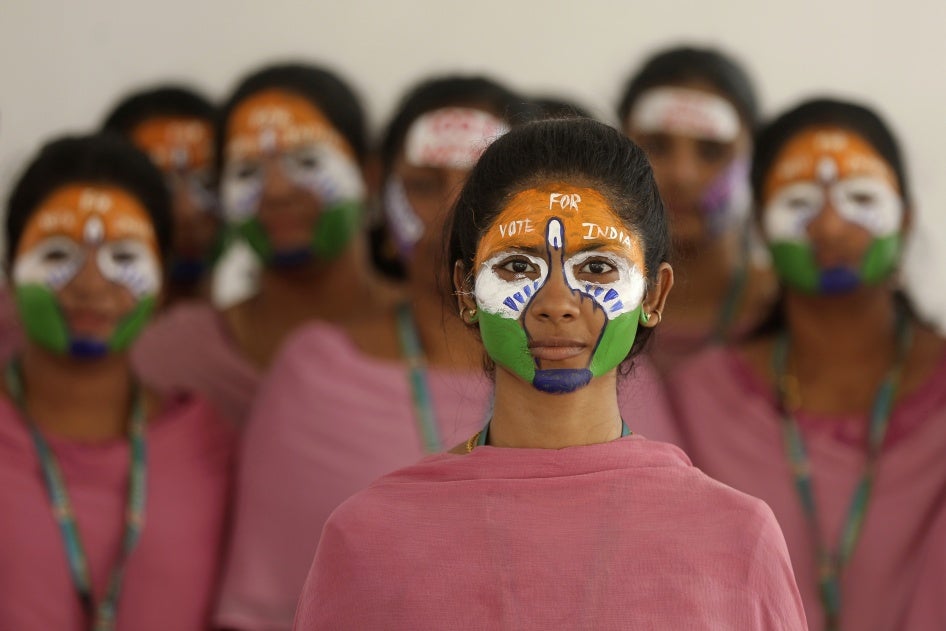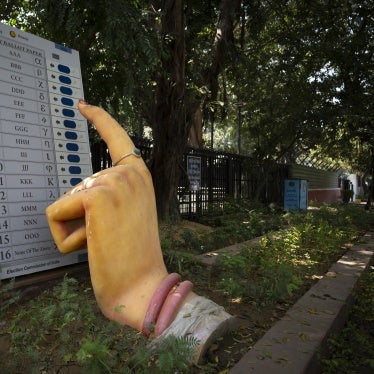(New York) – Voters in India will cast their ballots in a six-week general election beginning April 19, 2024, amid concerns that Indian authorities exert considerable control over the digital ecosystem that can make for an uneven playing field, Human Rights Watch said in a question-and-answer document released today. The party or coalition of parties that wins a majority of 543 seats in the lower house of Parliament will nominate a candidate for prime minister and form a government.
Human Rights Watch examined potential threats to India’s online environment ahead of the elections. The authorities have increased their control over digital platforms and amassed extensive amounts of personal data, which may affect the campaign environment. Human Rights Watch details the additional steps technology companies should take to meet their human rights responsibilities in this election.
“The risk of misuse of technology in India’s election is significant and could result in further tilting the playing field in favor of the ruling party,” said Deborah Brown, acting associate technology and human rights director at Human Rights Watch. “The Election Commission of India should ensure that all political parties comply with the model code of conduct and that their use of technology in campaigning respects human rights.”
Human Rights Watch reviewed popular companies’ policies and found that all companies could do more to address any aspects of their products, services, and business practices that may cause, contribute, or be linked with undermining free and fair elections.
Indian political parties campaign extensively through digital platforms. Ahead of the upcoming elections, political advertising on Google surged in the first three months of 2024. The governing Bharatiya Janata Party (BJP) has been the largest advertiser among political parties on both Google and Meta over the past three months, and has built a massive messaging operation through WhatsApp.
In recent years, Indian authorities have applied significant formal and informal pressure on tech companies, both to suppress critical speech and to keep online speech by government-aligned actors that would otherwise violate platforms’ policies. India shuts down the internet more than any other country, with the authorities frequently using internet shutdowns to stem political protests and criticism of the government, violating domestic and international legal standards.
Misuse of personal data, which can contain sensitive and revealing insights about people’s identity, age, religion, caste, location, behavior, associations, activities, and political beliefs, is a major concern in India’s elections. India has developed an extensive digital public infrastructure through which Indians access social-protection programs. The Indian government has collected massive amounts of personal data in the absence of adequate data protection laws to prevent misuse of this data during campaigning and to properly protect privacy rights.
There have already been reports of misuse of personal data in the campaign period, which started on March 16. On March 21, the Election Commission told the government to stop sending messages promoting government policies to voters, as it was a violation of the campaign guidelines. The message and accompanying letter from Prime Minister Narendra Modi to which it referred, had sparked concerns over data privacy as well as abuse of government communications for political purposes.
Social media platforms have come under scrutiny in recent years for failing to adequately invest in and address the use of their platforms to undermine participation in democratic elections. In India, Meta has faced criticism for failing to curb the spread of hate speech and incitement to violence, and for contributing to give the BJP an unfair advantage in political campaigning online during past elections.
The widespread availability of low-cost generative Artificial Intelligence (AI) tools that require little technical expertise raises new concerns. Generative AI can be used to create deceptive videos, audio recordings, and images impersonating a candidate, official, or media outlets. These are disseminated quickly across social media platforms, potentially undermining the integrity of the election or inciting violence, hatred, or discrimination against religious minorities. In the lead-up to the 2024 elections, several parties are using AI in their campaigns.
Companies should resist threats from the authorities when responding to government requests for data or content removals, Human Rights Watch said. They should treat all parties and candidates equitably, especially when it comes to addressing speech that incites violence or hatred.
Under the United Nations Guiding Principles on Business and Human Rights, companies have a responsibility to respect human rights and remedy abuses, including by addressing any aspects of their practices that contribute to undermining the right to participate in democratic elections.
“Ahead of India’s elections, tech companies need to demonstrate that their commitment to human rights is more than words,” Brown said. “This means adequately investing in content moderation, carrying out rigorous human rights impact assessments, and meaningfully engaging with civil society.”








